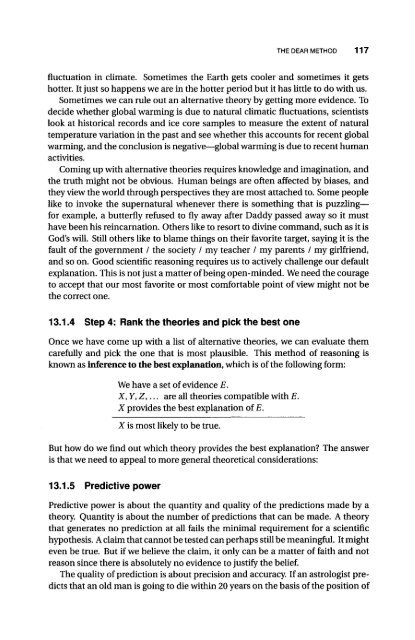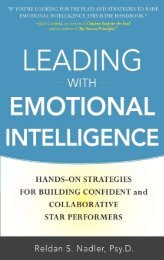An Introduction to Critical Thinking and Creativity - always yours
An Introduction to Critical Thinking and Creativity - always yours
An Introduction to Critical Thinking and Creativity - always yours
You also want an ePaper? Increase the reach of your titles
YUMPU automatically turns print PDFs into web optimized ePapers that Google loves.
THE DEAR METHOD 117<br />
fluctuation in climate. Sometimes the Earth gets cooler <strong>and</strong> sometimes it gets<br />
hotter. It just so happens we are in the hotter period but it has little <strong>to</strong> do with us.<br />
Sometimes we can rule out an alternative theory by getting more evidence. To<br />
decide whether global warming is due <strong>to</strong> natural climatic fluctuations, scientists<br />
look at his<strong>to</strong>rical records <strong>and</strong> ice core samples <strong>to</strong> measure the extent of natural<br />
temperature variation in the past <strong>and</strong> see whether this accounts for recent global<br />
warming, <strong>and</strong> the conclusion is negative—global warming is due <strong>to</strong> recent human<br />
activities.<br />
Coming up with alternative theories requires knowledge <strong>and</strong> imagination, <strong>and</strong><br />
the truth might not be obvious. Human beings are often affected by biases, <strong>and</strong><br />
they view the world through perspectives they are most attached <strong>to</strong>. Some people<br />
like <strong>to</strong> invoke the supernatural whenever there is something that is puzzling—<br />
for example, a butterfly refused <strong>to</strong> fly away after Daddy passed away so it must<br />
have been his reincarnation. Others like <strong>to</strong> resort <strong>to</strong> divine comm<strong>and</strong>, such as it is<br />
God's will. Still others like <strong>to</strong> blame things on their favorite target, saying it is the<br />
fault of the government / the society / my teacher / my parents / my girlfriend,<br />
<strong>and</strong> so on. Good scientific reasoning requires us <strong>to</strong> actively challenge our default<br />
explanation. This is not just a matter of being open-minded. We need the courage<br />
<strong>to</strong> accept that our most favorite or most comfortable point of view might not be<br />
the correct one.<br />
13.1.4 Step 4: Rank the theories <strong>and</strong> pick the best one<br />
Once we have come up with a list of alternative theories, we can evaluate them<br />
carefully <strong>and</strong> pick the one that is most plausible. This method of reasoning is<br />
known as inference <strong>to</strong> the best explanation, which is of the following form:<br />
We have a set of evidence E.<br />
X,Y,Z,... are all theories compatible with E.<br />
X provides the best explanation of E.<br />
X is most likely <strong>to</strong> be true.<br />
But how do we find out which theory provides the best explanation? The answer<br />
is that we need <strong>to</strong> appeal <strong>to</strong> more general theoretical considerations:<br />
13.1.5 Predictive power<br />
Predictive power is about the quantity <strong>and</strong> quality of the predictions made by a<br />
theory. Quantity is about the number of predictions that can be made. A theory<br />
that generates no prediction at all fails the minimal requirement for a scientific<br />
hypothesis. A claim that cannot be tested can perhaps still be meaningful. It might<br />
even be true. But if we believe the claim, it only can be a matter of faith <strong>and</strong> not<br />
reason since there is absolutely no evidence <strong>to</strong> justify the belief.<br />
The quality of prediction is about precision <strong>and</strong> accuracy. If an astrologist predicts<br />
that an old man is going <strong>to</strong> die within 20 years on the basis of the position of
















